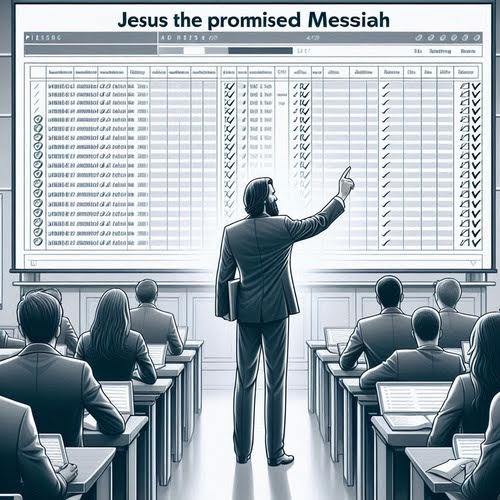Is Jesus the Jewish Messiah? Seven Arguments You Can’t Ignore
For two centuries, people have debated this question: Is Jesus the Jewish Messiah? We present seven compelling arguments in affirmation: we explore the fulfillment of Old Testament prophecies, the significance of the “Suffering Servant” passages, the timing of Jesus’ arrival, His unprecedented impact on world history, the evidence for His resurrection, the concept of a two-stage Messianic coming, and the testimony of spiritual transformation among His followers. Additionally, our FAQ section addresses common Jewish objections to this perspective. Let’s dive in…
Fulfillment of Prophecy The Hebrew Scriptures, written centuries before Jesus’ birth, contain over 300 prophecies about the Messiah. Jesus fulfilled these with astonishing accuracy, providing strong evidence for His being the Messianic role. Let’s examine some key prophecies:
- Born in Bethlehem (Micah 5:2): Despite his parents living in Nazareth, circumstances led to Jesus’ birth in Bethlehem, exactly as foretold.
- Born in David’s lineage (Isaiah 11:1): Both Matthew and Luke provide detailed genealogies tracing Jesus’ ancestry to King David.
- Born of a virgin (Isaiah 7:14): The Gospel accounts describe Jesus’ miraculous conception, fulfilling this prophecy.
- Riding on a donkey (Zechariah 9:9): This prophecy was fulfilled with Jesus’ triumphal entry into Jerusalem.
- Betrayed for 30 pieces of silver (Zechariah 11:12-13): Judas’ betrayal precisely matched this prediction.
- Hands and feet pierced (Psalm 22:16): Written centuries before crucifixion was invented, this accurately describes Jesus’ manner of death.
The probability of one person fulfilling all these prophecies by chance is astronomically low—estimated at 1 in 10^17. This mathematical improbability strongly suggests divine orchestration, pointing to Jesus as the promised Messiah.
The Suffering Servant Like Psalm 22, Isaiah 53 provides a remarkably detailed description of the “Suffering Servant,” interpreted by many early rabbis as referring to the Messiah. This passage aligns perfectly with Jesus’ life and mission:
- “Despised and rejected by mankind” (v.3): Jesus was ultimately crucified by His own people.
- “Took up our pain and bore our suffering” (v.4): Jesus’ ministry was characterized by healing and compassion.
- “Pierced for our transgressions, crushed for our iniquities” (v.5): This vividly describes Jesus’ crucifixion and its purpose.
- “By his wounds we are healed” (v.5): This reflects the Christian understanding of salvation through Jesus’ sacrifice.
- “Did not open his mouth” when oppressed (v.7): Jesus remained silent before his accusers (Matthew 27:12-14).
- Assigned a grave with the wicked and the rich (v.9): Jesus was crucified between criminals but buried in a rich man’s tomb.
The precise alignment between this prophecy and Jesus’ life offers yet another powerful argument for His Messianic identity, presenting a Messiah who suffers on behalf of others.
The Timing of the First Advent The book of Daniel provides a specific timeframe for the Messiah’s arrival—a remarkable prophecy that points directly to Jesus. In Daniel 9:24-27, we find the prophecy of the “seventy sevens” (often interpreted as 490 years):
- The countdown begins with a decree to restore and rebuild Jerusalem.
- After 69 “sevens” (483 years), the “Anointed One” (Messiah) will come.
- The Messiah will be “cut off” (killed) after the 69 sevens but before the 70th.
- Calculating from the decree of Artaxerxes to rebuild Jerusalem in 445 BC (Nehemiah 2:1-8), and accounting for differences between lunar and solar calendars, many scholars argue this timeline points precisely to Jesus’ triumphal entry into Jerusalem, just days before His crucifixion.
This extraordinarily precise timing provides compelling evidence Jesus appeared exactly when the Messiah was prophesied to come.
Impact on World History The Messiah was to be a “light to the nations” (Isaiah 49:6), bringing God’s salvation to the ends of the earth. Jesus’ impact on world Jewhistory is unparalleled, fulfilling this expectation:
- Christianity, stemming from Jesus’ teachings, is among the world’s largest religions with over 2 billion adherents.
- The calendar itself pivots around Jesus’ birth (BC/AD or BCE/CE), a testament to His historical significance.
- Jesus’ life and teachings have inspired countless works of art, literature, music, and philosophy across cultures and centuries.
- His message of equality and human dignity has influenced social movements and human rights advances.
- The concept of hospitals and care for the sick, inspired by Jesus’ teachings, has transformed healthcare globally.
No other figure in history has had such a profound, lasting, and global impact; thus is fulfilled yet another Messianic expectation.
The Resurrection The resurrection of Jesus is central to the claim of His being the Messiah. If true, it validates His claims and fulfils prophecies about the Messiah’s victory over death (e.g., Psalm 16:10). The evidence for the resurrection is compelling:
- Multiple, independent eyewitness accounts recorded in the Gospels and epistles.
- The transformation of the disciples from fearful deserters to bold proclaimers, willing to die for their beliefs.
- The rapid spread of Christianity in hostile environments, suggesting a powerful motivating event.
- The empty tomb, acknowledged even by Jesus’ opponents, with no alternative explanation gaining historical traction.
- The shift in worship practices among early Jewish believers, indicating a monumental event.
- The emergence of the Christian church, which hinged entirely on the truth of the resurrection.
The resurrection stands as a unique claim among religious figures and offers powerful support for Jesus’ Messianic role.
The Second Coming Sure, not all Messianic prophecies were fulfilled in Jesus’ first coming. However, the Bible predicts the Messiah will accomplish His mission not with one advent—but two. The two-stage coming of the Messiah reconciles OT prophecies about the Messiah that seem to contradict each other—about a suffering and triumphant Messiah:
- Jesus fulfilled prophecies of a suffering servant in His first coming.
- His promised return aligns with prophecies of the Messiah establishing a physical kingdom, bringing world peace, and gathering Jewish exiles.
- This two-stage coming is hinted at in some rabbinic writings and Old Testament passages (e.g., Zechariah 12:10).
- Jesus Himself spoke of His future return (Matthew 24:30-31, Acts 1:11), consistent with this understanding.
This framework coherently explains how Jesus can be the Messiah while some prophecies remain unfulfilled, anticipating their completion in His second coming.
Spiritual Transformation The prophets spoke of a time when God would transform people’s hearts (Ezekiel 36:26-27) and establish a new covenant (Jeremiah 31:31-34). Jesus’ followers throughout history claim to experience this inner transformation:
- Countless testimonies describe radical life changes, addiction recoveries, and moral transformations through faith in Jesus.
- The early Christian movement was characterised by ethical living that stood out in the Roman world.
- The fruit of the Spirit described in Galatians 5:22-23 aligns with the prophesied heart transformation.
- The concept of being “born again” (John 3:3) reflects this promised spiritual renewal.
The consistent testimony of changed lives through faith in Jesus, from the first century to today, offers compelling evidence of Jesus’ role in bringing about this prophesied spiritual transformation.
So, is Jesus the Jewish Messiah? The cumulative weight of fulfilled prophecies, the precise timing of Jesus’ coming, His unparalleled impact on world history, the evidence of His resurrection, the expected return, and the testimony of spiritual transformation among His followers present a formidable case for Jesus being the promised Messiah. The convergence of all these factors offers a compelling and comprehensive argument that Jesus of Nazareth is indeed the long-awaited Messiah foretold in the Hebrew Scriptures.
FAQs: Addressing Common Jewish Objections to Jesus as the Messiah
- If Jesus was the Messiah, why didn’t he bring world peace as prophesied? This objection is addressed by the concept of a two-stage coming of the Messiah. Jesus’ first coming focused on spiritual redemption and establishing God’s kingdom in the hearts of believers. His prophesied second coming is expected to fulfil the remaining prophecies, including establishing world peace. This two-stage paradigm reconciles seemingly contradictory prophecies about a suffering and triumphant Messiah.
- How can Jesus be the Messiah if he didn’t fulfil all the Messianic prophecies? While Jesus fulfilled numerous prophecies during his first coming, some remain unfulfilled. This is explained by the expectation of his future return. Many scholars argue that prophecies about the Messiah gathering exiles, rebuilding the Temple, and establishing universal peace will be fulfilled upon Jesus’ second coming. This perspective allows for a comprehensive fulfillment of all Messianic prophecies across both comings.
- Wasn’t the Messiah supposed to be a political leader who would restore Israel’s independence? While some Messianic prophecies do point to a political role, many others indicate a spiritual mission. Jesus fulfilled prophecies about a suffering servant (Isaiah 53) and a spiritual leader bringing inner transformation. His teachings about the Kingdom of God suggest a reign that transcends political boundaries. The expectation of his return also leaves room for a future political role in line with certain prophecies.
- How can Jesus be the Jewish Messiah when His followers broke away from Judaism? Early followers of Jesus, including the apostles, saw their faith as a fulfillment of Judaism, not a break from it. They continued to worship in the Temple and synagogues, observing Jewish customs. The gradual separation of Christianity from Judaism was a complex historical process, not an immediate break. Many Messianic Jews today practice a form of Judaism that accepts Jesus as the Messiah while maintaining Jewish identity and practices.
- If Jesus was the Messiah, why don’t most Jews accept Him? The reasons for widespread Jewish non-acceptance of Jesus are complex and historical. Many Jews expected a Messiah who would immediately fulfil all prophecies, including national restoration. Jesus’ crucifixion was also seen as incompatible with Messianic expectations. Additionally, centuries of persecution of Jews by some who claimed to follow Jesus created a significant barrier. However, throughout history, many Jews have accepted Jesus as the Messiah, seeing his life and teachings as fulfilling the deeper meanings of Messianic prophecies.
- If Jesus were the Messiah, wouldn’t He have rebuilt the Temple as prophesied? This objection is typically addressed in two ways. First, some argue that Jesus spiritually fulfilled this prophecy by referring to his body as the temple (John 2:19-21), and that believers now collectively form a spiritual temple (1 Peter 2:5). Second, those who anticipate Jesus’ second coming expect a literal fulfillment of this prophecy in the future. Both interpretations see Jesus as ultimately fulfilling this Messianic expectation, either spiritually or in a future physical sense.
Related Reads:
Editor's Pick

GPS Without Eyes: How Ants Silently Shout Intelligent Design
Picture a leafcutter ant navigating the rainforest floor in pitch darkness, carrying a leaf fragment 50 times its body weight. [...]

Born Broken: Why Must We Affirm Original Sin?
Imagine a world where we’re born neutral—free to choose good, and without a bias toward evil. Sounds appealing… until we [...]

Does God Truly Care About My Everyday Choices?
OWe believe God created the universe. We believe He orchestrated the exodus from Egypt and raised Jesus from the dead. [...]
SUPPORT US:
Feel the Holy Spirit's gentle nudge to partner with us?
Donate Online:
Account Name: TRUTHS TO DIE FOR FOUNDATION
Account Number: 10243565459
Bank IFSC: IDFB0043391
Bank Name: IDFC FIRST BANK






